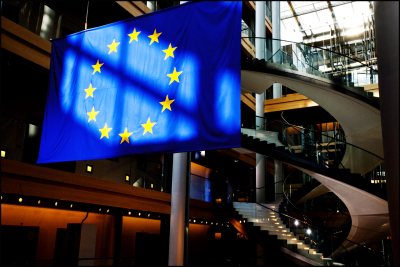At Transparency International EU, we believe that citizens deserve to know who is informing the decisions their elected representatives are taking, making governments more accountable in the process. Not only does this mean that policymakers should publish who they’re meeting, or whether they’re taking up jobs on the side, but that this data should be easy to reach, and easy to use.
The EU had a patchy record on both counts, which is why we launched our flagship monitoring platform, Integrity Watch EU, in 2014. From its inception, its aim has been clear: provide hard-to-reach data in a user-friendly visual format, to empower citizens, journalists and civil society organisations to directly monitor potential undue influence and conflicts of interest in the EU’s institutions.
Integrity Watch began humbly. We provided a single portal that allowed users to track MEPs’ outside incomes. This isn’t for lack of ambition: this included the only data related transparency and integrity any EU institution provided at the time! When the Commission finally did decide to publish the meetings Commissioners, as well as Cabinet Members and Directors-General, had been taking with lobbyists, they were scattered across over 90 different pages on the Commission’s website. When we refer to data being hard to reach, this is exactly what we mean. Integrity Watch EU was instrumental in pushing for these meetings to be published in a centralised manner in open data format, a best practice adopted in 2022.
A decade later and Integrity Watch EU now boasts a database of 52,206 meetings from the Juncker and first Von der Leyen Commissions and 64,151 Parliament meetings, as well as key information on 12,771 registered lobby organisations. We’ve also collected declarations of MEP side activities covering three legislative mandates, with the last mandate allowing users to scrutinise 1,822 side activities.
This evolution is the product of our longstanding demands towards the EU, arguing for stronger rules mandating greater transparency and political integrity. Here’s some of what we’ve achieved in that time:
- Publication of lobby meetings by MEPs
- A centralised open database of Commission lobby meetings
- Improved declarations of MEP side incomes
- Stricter post-employment rules for Commissioners
- Publication of lobby meetings by MEPs
- Addition of the EU Council to the Transparency lobby register
These come on top of numerous changes to internal institutional rules, from making the publication of lobby meetings mandatory for all MEPs, to stricter oversight of paid third-party travel for high-ranking Commission officials.
Data-driven advocacy is central to Integrity Watch EU. This is our ability to harness data to build narratives for change, such as our reports on big tech lobbying budgets and access, analysis of MEPs’ side incomes, corresponding conflict-of-interest risks, as well as our more recent work on the EU’s Green Deal and fossil fuel lobbying. And Integrity Watch doesn’t just help us: our mission is to empower journalists, academia and civil society to raise awareness of the ongoing shortcomings of the EU’s ethics system and improve policymaking in Brussels.
The success of Integrity Watch now reaches far beyond Brussels. From one platform in 2014, IW has grown to a full ecosystem of 19 versions, covering 17 countries. This has resulted in a database of over 70 datasets on lobbying, public official financial interests, public procurement, political finance. It can be accessed via the Integrity Watch Datahub. And the ecosystem will keep growing, with an additional six platforms slated for launch in the Balkans in 2024/2025.
The future looks bright for Integrity Watch EU. Our platform will evolve with a revamped interface to make it even easier to navigate. We will continue to add new data as we seize new opportunities to improve transparency and ethics rules at start of a new legislative mandate.
Now, more than ever, Integrity Watch EU remains an essential tool to hold EU decisionmakers to account. Repeated scandals have highlighted the necessity of access to reliable, high-quality integrity data. Integrity Watch is a necessary part of achieving that goal, but we still have a long way to go:
- Commission lobbying data only covers the tip of the iceberg
- Parliament integrity data remains scattered across 720 individual MEP pages
- Enforcement of rules remains rudimentary at best, with many loopholes
At Transparency International EU, we believe the EU institutions should be open by default. We will always fight for greater transparency, accountability, and integrity of the decisions made on our behalves. Every citizen empowered by open data is crucial in helping us get there.
Interested in collaborating? Feedback or tips? Get in touch with us!





